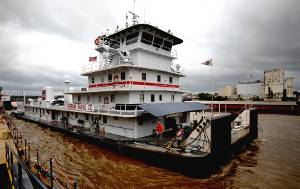
Ingram Barge Company has been named as one of the first marine transportation companies to be accepted as a partner in the U.S. Environmental Protection Agency’s SmartWay Program. The announcement was made by Craig E. Philip, CEO of Ingram Barge Company.
The EPA program, launched in 2004, was created to identify products and services that reduce transportation related emissions. The program quickly spread to partnerships with government, businesses and consumers – all resulting in measurable air-quality improvements or greenhouse gas (GHG) reductions.
The program includes a division for transportation – but previously not a marine transportation division. Ingram Barge Company is one of the first accepted into the program, which requires measuring the environmental performance of a fleet, identifying goals for improving environmental performance within three years, submitting an action plan to the EPA within six months of agreement to participate, and reporting progress to the EPA annually.
(www.ingrambarge.com)



